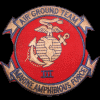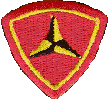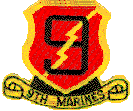BRAVERY AND DEATH IN RED AMBUSH
By Robert D. Ohman
Da Nang, Viet-Nam, 13 May (1966)
Pvt. Reuben Morales is a young Marine who went out on a routine patrol yesterday with 13 buddies. They left the company area in a broad valley 17 miles southwest of Da Nang, at 6:30 a.m.
Three hours later, about 200 Viet-Cong attacked the patrol.
Morales was one of only two men who survived, but the patrol killed 30 guerrillas before being overwhelmed.
Marine Corps reinforcements plus artillery and air strikes killed 145 more Viet-Cong in the battle that ended at dusk.
Morales, 19, La Puente CA, said today from his hospital bed that he was shot in the head and neck, feigned death as Viet-Cong executioners killed other Leathernecks - and fled from a burning evacuation helicopter before finally being rescued.
THE BATTLE OPENED as a patrol was crossing a rice paddy. "The first guy hit was the point man," Morales said. "Then they hit a corpsman and then a private on the right flank."
As bullets poured into the patrol, one struck Morales' head, and he fell.
"The radio was hit, and we couldn't call the company," Morales said. "When someone tried to run, he was hit. A Filipino boy - he had only two days left to serve here -- tried to make a run for it. He was hit in the back, but got up and started running again. Then he was hit again and fell. I knew he was running for help.
"He fell three different times. I stood up after the second time. I was dizzy, but I could see the Viet-Cong coming toward us. I wanted to take it standing up. The other guys who could stand, stood up, firing away. The wounded were shooting too. They fought all the way.
"The Viet-Cong? You could close your eyes and not miss.
" I ran out of ammunition when the V.C. hit the first paddy wall, a low mound of dirt, and I was ready to start swinging my rifle when I got hit in the neck.
"I FELL ON MY BACK but I was not unconscious. I heard all the noises - the mortars and grenades.
"A few seconds later, it stopped. Then the shooting started again. I opened my eyes and saw the Viet-Cong shoot two other guys out in front of me on the second paddy wall.
"I heard them coming toward me and closed my eyes. They took my rifle, a grenade I had, and ammunition. Then one picked me up by the shirt to search me, but dropped me back. I was waiting, thinking, 'When will he pull the trigger?'
"More shooting started and the two V. C. near me started walking away. When the mortars opened up, I looked and saw them running back into the treeline.
"I heard another Marine calling, 'Corpsmen. Over here. Over here!' I heard our troops (the reinforcements) trying to get to us, but they couldn't. After awhile the other Marine stopped hollering.
I was scared. I though we had been left."
AS THE SUN ROSE HIGHER, temperatures went above 100 degrees. Morales, lying for more than three hours in the parched rice paddy and blistering under the burning heat, decided to take a chance.
"As I started to craw, I expected them to shoot me in the back," he said. "There was a Marine with his legs over the paddy wall. He said he couldn't move and I told him I'd be back. I could see our troops across the field, but they were moving very slow.
"I came to another trooper from our squad, but he couldn't move his legs. And I saw three others, all of them face down. I guess they were dead. Then I crawled over to Binkley. He said he was all right, but he couldn't use his arms."
Pfc. James K. Binkley, 19, of Ashland City TN was the other survivor of the patrol. He was shot through both arms. The Viet-Cong also took his rifle and passed him for dead.
MORALES TOOK OFF BINKLEY'S cartridge belt and "we started moving to where we could see our troops kneeling. Then we started walking and when we finally got there, the first thing we asked for was water."
Morales and Binkley were given water and first aid. With a number of Marines suffering from heat exhaustion, they waited for a medical evacuation helicopter.
"I ran to the helicopter," Morales reported. "There was all sorts of firing and a lot of confusion. Someone said a bullet hit the chopper's fuel line and we had to get out. I ran and dived into some weeds -- I heard slugs flying over us. The (helicopter) crew told us the chopper was going to explode and I ran again, just before it blew up."
Pfc Larry Stulz, 21, Chicago, who was in Morales' I Company and near the burning chopper, tossed a rifle to his friend. They ran to a trench. "When another chopper landed, I gave my rifle to a trooper and went out," the dark-skinned, dark-eyed young Marine recalled. "it brought me here."




